|
|
|
Sort Order |
|
|
|
Items / Page
|
|
|
|
|
|
|
| Srl | Item |
| 1 |
ID:
132400
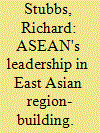

|
|
|
|
|
| Publication |
2014.
|
| Summary/Abstract |
Despite none of its members being a major economic or military power, the Association of Southeast Asian Nations (ASEAN) has played a leading role in building East Asia's regional institutions. In exploring this apparent puzzle, the analysis reviews the literature on state leadership at the regional and international level, asks why the region's major powers ceded leadership on the question of regional institution building to ASEAN, and assesses the consequences for East Asia's regional architecture of ASEAN's leadership role in institution-building. The conclusion is that leadership at the state level entails a state, or a group of states, proposing, executing and getting others to agree on a course of action to deal with a specific problem or challenge. The analysis also underscores the point that, while ASEAN has been the leader in East Asian institution-building, the Association and its members should not automatically be expected to play a leadership role on all issues preoccupying the region.
|
|
|
|
|
|
|
|
|
|
|
|
|
|
|
|
| 2 |
ID:
127776
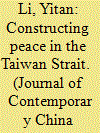

|
|
|
|
|
| Publication |
2014.
|
| Summary/Abstract |
Economic integration in the Taiwan Strait has become increasingly stronger recently. Economic integration should have led to stronger political convergence. Why hasn't it occurred? I argue that democracy in Taiwan and the continuation of the single-party rule in China have created two very different social experiences. These different social experiences have formed two different identities. People in Taiwan are increasingly thinking of themselves as Taiwanese rather than Chinese. The growing level of popular nationalism in China has also altered the political identity of mainland Chinese. Such change could force Beijing to accommodate citizens' demand to act more toughly towards Taipei. Further political integration is still possible, but it would require another norm change, perhaps already in the making.
|
|
|
|
|
|
|
|
|
|
|
|
|
|
|
|
| 3 |
ID:
132711
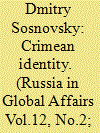

|
|
|
|
|
| Publication |
2014.
|
| Summary/Abstract |
Kiev's attempt to build an all-Ukrainian identity solely on the basis of the Ukrainian ethnos through political centralization, cultural unification, and forceful assimilation was a complete failure. Now, as part of the Russian Federation, which pursues an entirely different regional policy, Crimea has an opportunity to form its own regional identity.
|
|
|
|
|
|
|
|
|
|
|
|
|
|
|
|
| 4 |
ID:
132409


|
|
|
|
|
| Publication |
2014.
|
| Summary/Abstract |
Several East Asian countries, with scarcely any crude oil, have developed since the second half of the twentieth century strong production capacities in refining and petrochemicals. This has been the case in Japan, Taiwan, Singapore, South Korea, Malaysia, Thailand, Indonesia and China. This paper assesses whether the development of refining and petrochemical industries in these countries may be better understood with the aid of one of the major interpretative paradigms of structural change and foreign relations in East Asia: the Flying Geese Paradigm. The article concludes that, overall, the production and external relations in oil-related industries do indeed follow a Flying Geese Paradigm pattern. We observe, nevertheless, some dissonances that are attributable to the particularities of intermediate sectors (such as refining and basic petrochemistry).
|
|
|
|
|
|
|
|
|
|
|
|
|
|
|
|
| 5 |
ID:
155044
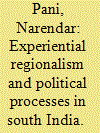

|
|
|
|
|
| Summary/Abstract |
Regional identities have periodically asserted themselves in Indian politics, both before and after Independence. The intensity of this regionalism has, however, tended to vary quite substantially from state to state and over time, ranging from a somewhat benign influence on state politics to demands for secession. These differences are typically explained in terms of specific local political conditions. While the local is undoubtedly important, this article argues that a larger theoretical explanation is also possible: Once we recognize that regionalism operates in multiple spaces, it becomes evident that the way these spaces are experienced has its influence on the practice of local politics. The article goes on to match its theoretical expectations with the politics of regionalism in the neighboring south Indian states of Karnataka and Tamil Nadu.
|
|
|
|
|
|
|
|
|
|
|
|
|
|
|
|
| 6 |
ID:
094987
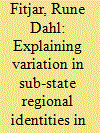

|
|
|
|
|
| Publication |
2010.
|
| Summary/Abstract |
While national identities emerged as the dominant source of territorial identification during the twentieth century, sub-state regional identities are becoming increasingly important in some Western European regions. However, this is not a uniform development. In some regions, nearly half of respondents in Eurobarometer surveys claim a stronger attachment to the region than to the state. In others, less than 4 per cent are primarily attached to their region. This article examines the extent to which these differences are explained by the characteristics of the regions themselves. What, if anything, do regions that mobilise public identity have in common? Developing a model of regional identities, the study examines cultural, geographic, economic and political factors that vary across different regions in Western Europe. The study finds that regional identities tend to be stronger in regions where a regional language is spoken and which do not border the state capital, signalling a cultural and a centre/periphery dimension to regional identity formation. However, there is potentially a more strategic aspect to identification, as regional identities are likely to be stronger in economically developed regions and in regions with highly distinctive voting behaviour.
|
|
|
|
|
|
|
|
|
|
|
|
|
|
|
|
| 7 |
ID:
131322


|
|
|
|
|
| Publication |
2014.
|
| Summary/Abstract |
Globalisation is transforming the world. The causes are varied, but they include destabilising repercussions of globalisation alongside regional, ethnic and religious hostility. The changes have placed an even higher premium on accepted rules to govern predictable international behaviour. New Zealand must adjust its external policies to this threshold moment. It must urge a greater role for the growing powers like China in the management of the world economy and reaffirm the primacy of the rule of international law, especially as it seeks to tighten ties with the United States. New Zealand's efforts to be a good international citizen will be tested later in the year when its bid for a Security Council seat is resolved.
|
|
|
|
|
|
|
|
|
|
|
|
|
|
|
|
| 8 |
ID:
128531
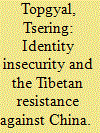

|
|
|
|
|
| Publication |
2013.
|
| Summary/Abstract |
This article re-examines the five-decade-old Tibetan struggle against Chinese rule, asking what drives this multifaceted resistance. It argues that identity insecurity has been at the heart of the Tibetan struggle, and takes a position against the problematic practice in both the academic literature and popular discourse of treating Chinese policies and practices as security-driven and the Tibetan struggle as motivated by ethno-nationalistic impulses. It charts the vigorous contestation within the Tibetan diaspora between those standing issue images_86_3_Topgyal_Tibet_03for complete independence and others who are satisfied with "greater autonomy" and examines the multifaceted resistance inside Tibet. It also recognizes the unifying effects of the widespread loyalty to the Dalai Lama and fears for the survival of the Tibetan identity. The article also examines the links between Tibet and its diaspora. All these themes are developed while demonstrating the security rationale behind the Tibetan struggle
|
|
|
|
|
|
|
|
|
|
|
|
|
|
|
|
| 9 |
ID:
132401


|
|
|
|
|
| Publication |
2014.
|
| Summary/Abstract |
Indonesia is often regarded as the natural leader of the Association of Southeast Asian Nations (ASEAN) in light of its geographical dimensions, large population, strategic position and natural resources. The country has felt entitled to a position of leadership and has generally been recognized by the other ASEAN members as first among equals. While the de facto leadership of Indonesia has traditionally been accepted as conventional wisdom, little attention has been given to the extent to which Jakarta has actually succeeded in exercising leadership in ASEAN and how its attempt to do so has been perceived by the other Southeast Asian states. The paper explores this question by focusing on Indonesia's ability to provide international public goods in the areas of security and economics, engage in conflict management and promote institution building. It argues that the country has sought to establish a stable and autonomous security environment, to conduct conflict meditation efforts in the Cambodian conflict and the South China Sea disputes, and to develop institutional mechanisms to promote security, democracy and human rights among other issues. Still, Indonesia's leadership in ASEAN has been incomplete due to resistance from some members to its preference for an autonomous regional order and in recent years a democratic form of domestic governance. Its leadership has so far also been limited to the political and security spheres, leaving other sectors, like the economy, to others.
|
|
|
|
|
|
|
|
|
|
|
|
|
|
|
|
| 10 |
ID:
129404
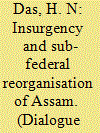

|
|
|
|
|
| Publication |
2014.
|
| Summary/Abstract |
From the beginning of human existence people have moved in groups in search of food and also for ensuring security. Groups have expanded into ethnic communities with separate identities, then into races and ultimately into nations. People have come to distinguish themselves by the colour of their skins; the different languages they speak, faith, religion or regions they inhabited. As civilization advanced, people
became more attached to one community or another. Particular territories were carved out as the habitat of particular communities or races. Even within universal empires sub-divisions became discernible. Sometimes racial conflicts arose. The imperial powers had to intervene and mediate in such disputes
|
|
|
|
|
|
|
|
|
|
|
|
|
|
|
|
| 11 |
ID:
132283
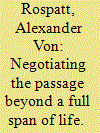

|
|
|
|
|
| Publication |
2014.
|
| Summary/Abstract |
Among the rich heritage of medieval forms of Tantric Buddhism and Hinduism surviving among the Newars of the Kathmandu Valley is a unique series of elaborate old age rituals that are performed upon the attainment of a particular age. Drawing upon the vocabulary of planetary appeasement and other birthday rituals of life-cycle sacraments and of dh?ra?? practice, they serve to protect and sanctify the celebrants and prolong their life. After offering a comprehensive overview of these rituals that registers local variations, this paper probes into their origins and function and, in the process, pays particular attention to the intricate ways in which the Buddhist and Hindu versions of these ceremonies relate to each other.
|
|
|
|
|
|
|
|
|
|
|
|
|
|
|
|
| 12 |
ID:
132399
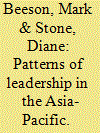

|
|
|
|
|
| Publication |
2014.
|
| Summary/Abstract |
Leadership at the regional level has come under the spotlight not only in the post-Cold War context, but also more recently following the global financial crisis. Yet, leadership by states within region-building and regional associations as leaders vis-à-vis other regions or powers remains relatively new territory for analysis and consideration, even though the Association of Southeast Asian Nations (ASEAN) has attracted both admirers and sceptics. This introductory essay is intended to achieve two principal objectives regarding this symposium addressing Asia-Pacific regional leadership. First, we seek to put the 'Asia-Pacific' in historical context and identify some of the forces that have not only shaped but also hindered its realization. Recognizing China's historical role and contemporary rise is important to understand the parameters within which ASEAN and its member states seek to define particular visions of regional identity and enact collective enterprises. The other key background consideration when thinking about contemporary leadership in the Asia-Pacific is that the United States is seemingly in decline. The Asia-Pacific's two most consequential powers - the United States and China - are pervasive considerations for any regional organization that aims to lead and promote cooperation to solve collective action problems.
|
|
|
|
|
|
|
|
|
|
|
|
|
|
|
|
| 13 |
ID:
093165


|
|
|
| 14 |
ID:
127775


|
|
|
|
|
| Publication |
2014.
|
| Summary/Abstract |
This paper reviews the perceptions of the CA states (Kazakhstan, Kyrgyzstan, Tajikistan and Uzbekistan) towards the Shanghai Cooperation Organization (SCO) and conceptualises the CA states' motivations and concerns in engaging in cooperation within the SCO vis-à-vis China. The message that this paper aims to deliver is that, for the majority of the CA leadership and public, China within the SCO represents the CA states' 'other', with decolonising but increasingly dominating features. These perceptions of China in the CA region elucidate the ways in which China's involvement in Central Asia has a paradoxical and contradictory impact on the potential for the SCO to move beyond functionalism and towards the creation of a broader SCO identity. Consequently, the future of the SCO may be more limited than the West fears and Central Asia hopes.
|
|
|
|
|
|
|
|
|
|
|
|
|
|
|
|
| 15 |
ID:
130175
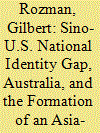

|
|
|
|
|
| Publication |
2014.
|
| Summary/Abstract |
Australia is a middle power caught between rising dependence on China, which seeks a sinocentric region, and growing security reliance on the U.S., which strives for a trans-Pacific community supporting universal values. In light of the Sino-U.S. identity gap and different concepts of regionalism, its response becomes clearer.
|
|
|
|
|
|
|
|
|
|
|
|
|
|
|
|
| 16 |
ID:
132514
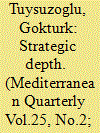

|
|
|
|
|
| Publication |
2014.
|
| Summary/Abstract |
The change in Turkish foreign policy in the twenty-first century's second decade has its origin in the approach referred to by Turkish foreign minister Ahmet Davutoglu as Strategic Depth. Because it aims to give Turkey status as a Eurasian power, this approach has been described as neo-Ottomanism, referencing the geographic extent of the Ottoman Empire. Because of its intrinsic pragmatism and the geographical region that is its focus, Strategic Depth has been influenced by Eurasianist thought in Russia. But the Strategic Depth approach differs from Russian Eurasianist ideas because it refuses to place itself in conflict with Western civilization and instead positions Turkey as a bridge between Western and Muslim civilizations. To this extent, Strategic Depth may be described as a conservative interpretation of Turkish Eurasianism.
|
|
|
|
|
|
|
|
|
|
|
|
|
|
|
|
| 17 |
ID:
145469
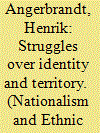

|
|
|
|
|
| Summary/Abstract |
This article explores how ethnoreligious conflict over boundaries and territoriality involves a politics of scale, that is, how positions and demands are framed by actors according to, for instance, local, regional, and national scales. The analysis focuses on how Muslim actors in a conflict in Kaduna State in Nigeria frame a regional, northern Nigerian identity that varies in content and form depending on the scalar context in which communal conflict is placed with regional and national politics yielding different identifications.
|
|
|
|
|
|
|
|
|
|
|
|
|
|
|
|
| 18 |
ID:
132402
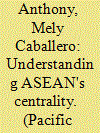

|
|
|
|
|
| Publication |
2014.
|
| Summary/Abstract |
There have been a number of articles about ASEAN's centrality in the regional security architecture of Asia. Yet, the notion of centrality remains undefined and under-operationalised. Implicit in the discourses of centrality is the idea of ASEAN's leadership, which in turn raises questions about ASEAN's ability to do so, given its limited capacity. This article defines ASEAN's centrality from the perspective of social network approach and argues that ASEAN's structural position in the density of networks that it has established and those that it has linkages with explains ASEAN's centrality. Despite its lack of material power, ASEAN has been able to claim centrality because of its position as a node in a cluster of networks, and this condition of 'high betweenness' allows ASEAN to exercise influence in regional processes with the tacit acceptance of major powers. However, while centrality may have been achieved, maintaining centrality in a rapidly changing regional environment compels ASEAN to address challenges to its centrality. This would necessarily include its ability to maintain consensus, carry out collective action and achieve its stated goals.
|
|
|
|
|
|
|
|
|
|
|
|
|
|
|
|
| 19 |
ID:
131903
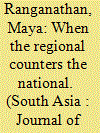

|
|
|
|
|
| Publication |
2014.
|
| Summary/Abstract |
The central role that regional-language identities play in the communicative and cultural settings of South Asia is best reflected in the regional media landscape. The varied influences of regional media on a nation's polity and society in multilingual countries like India have largely been evaluated within the framework of the reconstitution of public space. This paper furthers such studies by arguing that the reconstitution of the Indian public by regional media is, in some instances, effected through a discourse that counters the mainstream, or the 'national-nodal point'. At a time when coalition national governments comprise or depend upon the support of regional political parties for survival, a counter-hegemonic regional discourse can have far-reaching effects, extending the regional media's sphere of influence significantly-from national politics to international relations. Through an analysis of the constructions of the Sri Lankan ethnic issue in the English- and Tamil-language press, I draw out the significance of 'counter-hegemonic' representations in the regional media.
|
|
|
|
|
|
|
|
|
|
|
|
|
|
|
|
|
|
|
|
|